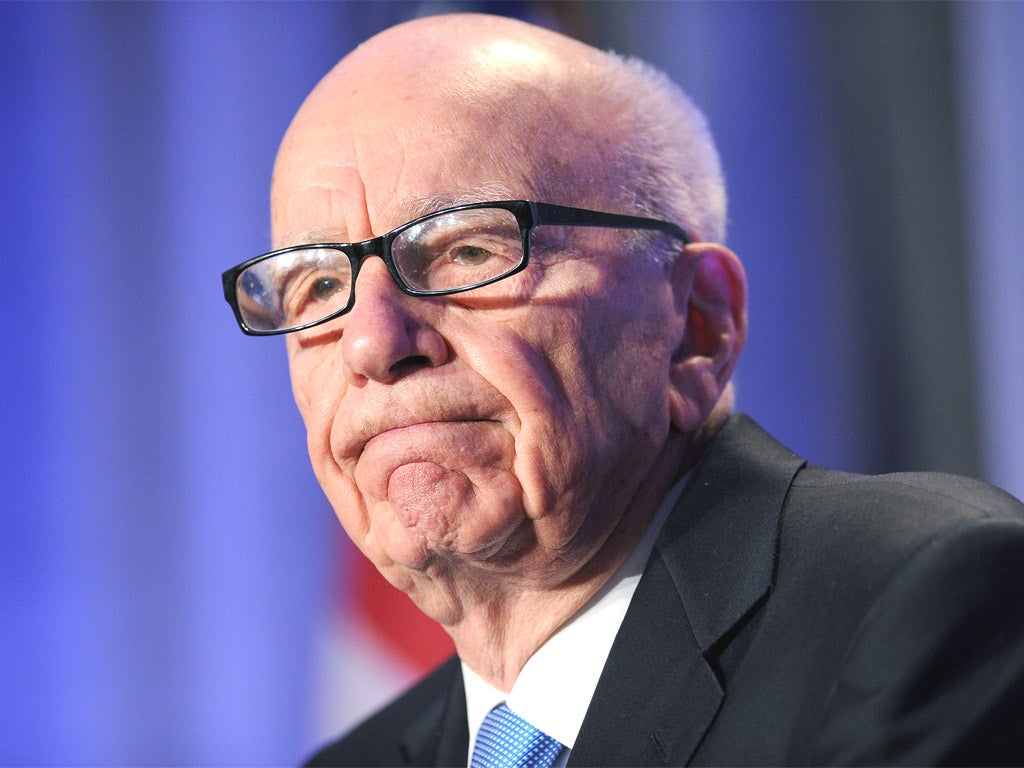Rupert Murdoch ready to break up his scandal-hit media empire
Tycoon may cede day-to-day control of newspapers to focus on entertainment brands

Rupert Murdoch, bloodied by the phone-hacking scandal and under pressure over his stewardship of his media empire, is close to giving his blessing to a radical restructuring of News Corp that could see him relinquish day-to-day control of his newspapers.
The company is considering separating Mr Murdoch's beloved newspaper publishing division into a separate stand-alone company in a move that would inoculate the rest of the business from the hacking scandal and make it easier to resume its courtship of BSkyB, but which is likely to raise pressure for big cost-cuts across the UK titles. The split opens up the possibility that Mr Murdoch will no longer hold any executive role in the newspapers. Under the plan as conceived, he will remain chief executive of News Corp, while the leadership of the publishing company is to be decided. News Corp's board is to discuss the plan today, and an announcement could come as early as tomorrow.
The newspaper division – which includes the Sun, The Times and The Sunday Times in the UK, with the Wall Street Journal and New York Post in the US and more than 100 papers in Australia – will be bundled with book publisher, HarperCollins, and floated off as a stand-alone company.
At least initially, News Corp proper and the new publishing company will have the same shareholders, and both will be controlled by Mr Murdoch and his family. Outside shareholders have demanded the sale, closure or spin-off of News Corp's publishing interests for many years but have always been blocked by Mr Murdoch, whose love for the newspaper business has trumped stock market maths. Publishing is a much less profitable business than television and film-making, which makes up three-quarters of News Corp's revenues and almost 90 per cent of its profits. The company's broadcasting interests include Fox, which makes The Simpsons and American Idol, and Fox News in the US, and Star TV in Asia, and it also owns Twentieth Century Fox, the movie studio behind Avatar.
Chase Carey, Mr Murdoch's right-hand man, is believed to have been keen to rid News Corp of its publishing arm, and James Murdoch staked his claim to take over the company from his father on a similar promise to reduce News Corp's interest in newspapers. "Television is vastly more profitable and a big opportunity," James Murdoch said in a 2009 speech that marked a break from his father. Since then, James Murdoch has been appointed to, and then resigned, the chairmanship of News International, holding company for the British papers, with disastrous consequences for his prospects of rising to the top of News Corp.
His father, meanwhile, has had to bend, if not bow, to pressure to take outside shareholders' concerns more seriously, now newspapers have caused so much legal trouble for the group. The Wall Street Journal flew a kite for the separation yesterday, reporting that Mr Murdoch has "warmed to the idea". The story was confirmed by the company later in the day, and investors took no time to signal their approval: News Corp shares rose more than 6 per cent.
"This is a move shareholders have been hoping for for years, especially after the phone-hacking scandal," said Michael Corty, analyst at Morningstar. "News Corp has a great collection of entertainment assets, including its movie and TV studio, the Fox broadcast network, domestic and foreign cable networks, and its 39 per cent stake in BSkyB. We think less of the publishing assets, given the headwinds facing the newspaper operation in the US, the UK and Australia."
As a stand-alone company, the publishing division would face much more intense scrutiny of its financial results than it does inside News Corp.
Q&A: What now for News Corp?
Q. If News Corp were to separate itself in this way, would Rupert Murdoch then look to sell its loss-making newspapers?
A. The Times will have to be prised out of Rupert Murdoch's cold, dead hands. The beauty for him of the split is that he will still control the destiny of the publishing arm. Irritating News Corporation investors who have been telling the company to get out of the publishing business and concentrate on television can simply sell their shares in the new publishing company.
Q. But will there be pressure to cut costs?
A. You bet. If not a rounding error exactly, the results of the newspaper and book-publishing interests have not been hugely significant to News Corporation overall. As a standalone company, the shares are likely to underperform badly unless Mr Murdoch cracks the secret of making money in the digital era – or cuts costs to keep up with declines in advertising and circulation.
Q. So could the 'good' News Corp now buy BSkyB?
A. Mr Murdoch will still control News Corporation and will be no more or less "fit and proper" than he is now, before the split. The floating-off of the newspaper business, though, will put some distance between the hacking scandal and the rest of the company into which BSkyB would be folded, which could bring forward the date when a new bid is politically feasible.
Join our commenting forum
Join thought-provoking conversations, follow other Independent readers and see their replies
Comments
Bookmark popover
Removed from bookmarks